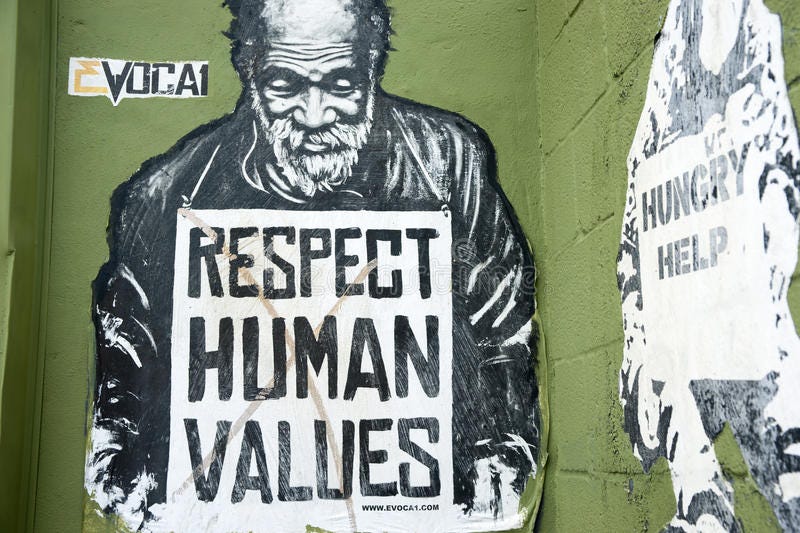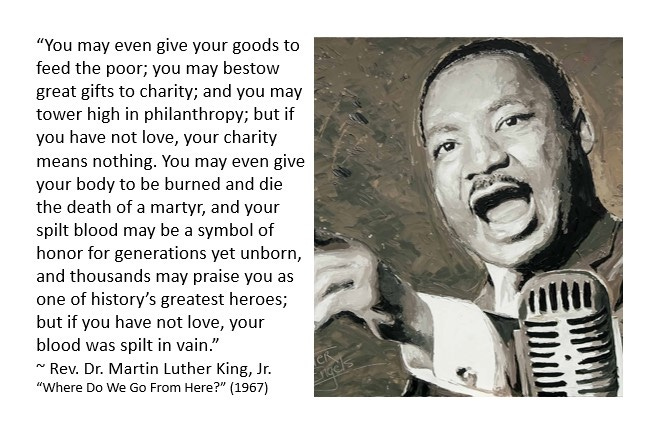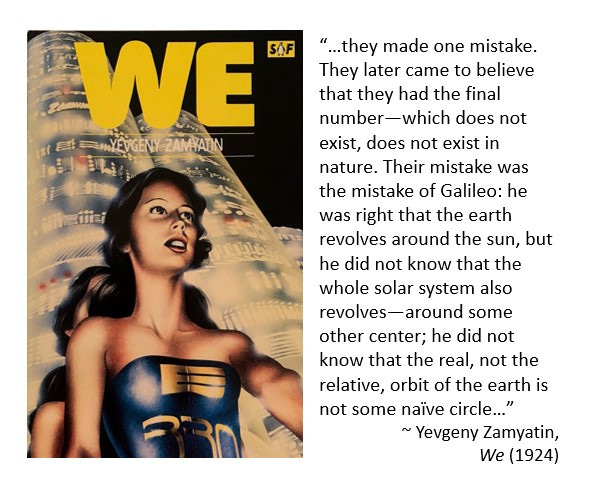Values Over Victory: Why We Should Prioritize Exemplifying Our Values Over Winning/Losing
Part two of a series of posts exploring the humanities and social change
Too often contemporary politics promotes a superficial and performative political engagement rather than a politics rooted in values related to our basic sense of self. Politics is reduced to party affiliation, short-term, cost-benefit calculations, and periodic electoral choices; rather than a deeper consideration of what it means to exemplify the changes we wish to see enacted in society.
We must learn to ignore fatalistic prognosticators and recognize the superficiality of those who insist the only metric in evaluating social change is wins/loses; that our core values should be consistently subordinated to pragmatic compromise. This is precisely the kind of narrow, reductive thinking that generates cynicism and fatalism among change agents.
Victory is not only impermanent but also not entirely within our control. What is in our control is the exemplification of our values—of human dignity, love, justice, creativity, truth, wholeness, autonomy, non-violence, reason, dialogue. To combat fatalism as we do our part in making a better world we must recognize the importance of exemplifying our values.
We cannot “have” success, “have” freedom, “have” justice. We must continuously manifest these values and create the conditions that sustain their expression. The values of human dignity, love, justice, creativity, truth, wholeness, autonomy, non-violence, reason, and dialogue are not objects that can be acquired. They are ideas referring to human capacities that we deem important. We must birth them into existence through our very being. They exist only insofar as we exemplify them.
That we inevitably lose some of our struggles to make the world a better place is no more a reason to abandon our commitment to justice than the inevitability of death is a reason to abandon life.
If our activism is rooted in our deepest values—in our fundamental love of others, for example—then we are less easily defeated and deflated when our expression of love for others in a campaign to prevent a cruel policy is defeated. When values are at the center of our political projects, we come to accept that battles are sometimes won and sometimes lost. Though we wish to succeed in alleviating injustice and suffering, our values will not permit the difficulty of our mission to justify giving up. We can no more give up on our core values than we can living. That we inevitably lose some of our struggles to make the world a better place is no more a reason to abandon our commitment to justice than the inevitability of death is a reason to abandon life.
If our politics is rooted in our foremost values, then our efforts are not simply something we “perform,” they are part of who we are. We can better grasp the distinction by turning to pioneering social theorist, Erich Fromm’s book, To Have or To Be? (1976), where he differentiates between the having and being modes of existence. Our society cultivates a sense of self based on acquisition, possession, and consumption rather than exemplification—being. Fromm writes that the having mode makes possessions of everything, including beliefs and values. Our primary concern becomes possessing, protecting, or increasing our things, our “possessions.” The being mode, by contrast, centers on “life, activity, birth, renewal, outpouring, flowing out, productivity.” Being, as Fromm conceives of it, “is the opposite of having, of egoboundness and egotism.”
The difference between merely “having” and “being” was expressed in Rev. Dr. King’s 1967 speech, “Where Do We Go From Here?” where he differentiated between charitable acts born of vanity and those born of genuine love.
“You may even give your goods to feed the poor; you may bestow great gifts to charity; and you may tower high in philanthropy; but if you have not love, your charity means nothing. You may even give your body to be burned and die the death of a martyr, and your spilt blood may be a symbol of honor for generations yet unborn, and thousands may praise you as one of history’s greatest heroes; but if you have not love, your blood was spilt in vain. What I’m trying to get you to see this morning is that a man may be self-centered in his self-denial and self-righteous in his self-sacrifice. His generosity may feed his ego, and his piety may feed his pride. So without love, benevolence becomes egotism, and martyrdom becomes spiritual pride.”
Acts and undertakings motivated by image, vanity, and the satisfaction of egoistic approval lack genuine grounding in the values that give these acts their meaning. Thus while such undertakings may temporarily generate good results, even when undertaken by those with superficial allegiance to their motivating values, they are the result of the having mode of existence. And we should not be surprised that those who are in the having mode of political action will soon weary of an undertaking that does not result in the desired victory and the glory, power, and prestige that accompany it.
Breakthrough moments of social progress are often born in the very ashes of pessimistic predictions that change is not possible.
Our superficial politics is shaped by the having mode of existence, which reduces ideas and beliefs to things which one merely possesses rather than principles nurtured or starved within one’s self—one’s character. This gives rise, further, to the notion of “us” and “them,” to the idea that each side in an important political disagreement are ontologically different—made of different stuff; rather than people who, at present, hold different beliefs and might well grow into someone new, as we engage them in productive dialogue about their beliefs and values.
A politics of having makes goals, outcomes, or advances the center of our concern. A politics of being is principally concerned with enlivening the values that animate our political objectives: on being the change we seek and not merely achieving an abstract goal; on enhancing our own alignment with our values rather than forcing someone else to alter their behavior.
We should strive to live a life of principle in which our very existence—our ordinary, mundane activities and choices—as well as our specific activist efforts exemplify and enliven the values we profess to hold so dear. This is of course is not without its challenges. Each of us lacks perfected integrity, and it is sometimes the case that we struggle to consistently exemplify our professed values. Yet we must realize that successful social change cannot occur if we fail to make changes within ourselves that we wish the wider society to undergo, collectively.
For someone like Rev. King this meant exemplifying the love ethic: a love of life, humanity, truth, justice. Few of those seeking to produce political transformation of society have the power to single-handedly determine the outcome, let alone maintain it. We do have the power, however, to live lives of excellence exemplifying that which we deem to be the most precious—sacred. Living in this way, itself, makes for a worthy, meaningful existence.
 Tiktok failed to load.
Tiktok failed to load.Enable 3rd party cookies or use another browser
Read part one, “Humanities and Social Change: There is No Final Revolution”
The Virtue in Living Our Values
Zamyatin’s life choices reflect a similar prioritization of values over carefully calculated pursuit of political victory. He was a member of the early Bolshevik party, and was arrested for his role in the Russian Revolution of 1905. Though he remained a supporter of the revolt against the Tsar, Zamyatin spoke out against the new government’s crackdown on freedom of expression in daily life and the arts.
In We, I-330 speaks for Zamyatin when she scolds not the initial revolution that brought the One State into power, but their hubris in believing their new vision for society precluded future transformation. Addressing D-503, she says,
“Is it not clear to you, a mathematician, that only differences, differences in temperatures—thermal contrasts—make for life? And if everywhere, throughout the universe, there are equally warm, or equally cool bodies…they must be brought into collision—to get fire, explosion, Gehenna. And we will bring them into collision.”
“But I-330,” replies D-503, “you must understand—this was exactly what our forebears did during the Two Hundred Years’ War.”
“Oh, and they were right—a thousand times right. But they made one mistake. They later came to believe that they had the final number—which does not exist, does not exist in nature. Their mistake was the mistake of Galileo: he was right that the earth revolves around the sun, but he did not know that the whole solar system also revolves—around some other center; he did not know that the real, not the relative, orbit of the earth is not some naïve circle…”
We became one of the first novels to be banned by the Soviet Union’s censorship board. Zamyatin was soon blacklisted by the government and preventing from publishing his writing. “To me as a writer, being deprived of the opportunity to write nothing less than a death sentence,” he wrote in a 1931 letter to none other than Joseph Stalin.
“I have a highly inconvenient habit of speaking what I consider to be the truth rather than saying what may be expedient at the moment. Specifically, I have never concealed my attitude toward literary servility, fawning, and chameleon changes of color: I have felt—and I still feel—that this is equally degrading both to the writer and to the revolution.”
Stalin responded by inexplicably permitting him to leave the Soviet Union that same year. Zamyatin would die, six years later, in Paris as a principled and impoverished dissident. His greatest work of fiction—We—would not be published in its original language—Russian—until 1952, in New York, and would not be published in his home country, the Soviet Union, until 1988.
Who would doubt that many self-appointed “realists” of our day would have labeled Zamyatin’s political acts of defiance on behalf of freedom “impractical” and hopeless? Did he topple the Soviet Union? Did he gain material success in his lifetime? Yet Zamyatin offers a resounding rejection of such shallow conceptions of meaningful living. In his 1923 essay, “On Literature, Revolution, Entropy, and Other Matters,” Zamyatin wrote that the questions we ought to ask were these:
“Today we can look and think only as men do in the face of death: we are about to die—and what did it all mean? How have we lived? If we could start all over, from the beginning, what would we live by? And for what?”
Thus Zamyatin calls our attention to existential questions that transcend the mere means of life. We are reminded of our mortality and the values—the purpose—that give our lives meaning even as we are dragged into death’s inescapable grasp. The question before pertains less to victory than virtue: the exemplification of excellence, the actualization of our deepest human potentialities
Please share and like this post by clicking the heart icon.
Invite Dr. Nall to Speak
Dr. Nall delivers energetic live presentations and engaging workshops on the subjects featured in Humanities in Revolt. Those interested in booking a workshop or talk can get in touch through Facebook or by leaving a comment.
Subscribe
Subscribers will receive periodic posts pertaining to the broad domain of humanistic inquiry, from the insights of great thinkers throughout human history, the meaning and importance of critical thinking and ethics, the underappreciated poetry in everyday existence, to contemporary cultural analysis and the ongoing struggle to combat human oppression and violence. You will also have the opportunity to engage the author and our online community in dialogue about each post.
Why get a paid subscription?
Paid subscriptions directly support Dr. Jeffrey Nall’s efforts to produce and share publicly accessible independent scholarship and analysis. Supporting donations can also be made through PayPal. For more about my work go to JeffreyNall.com and find me on Twitter, Facebook, and Instagram.











